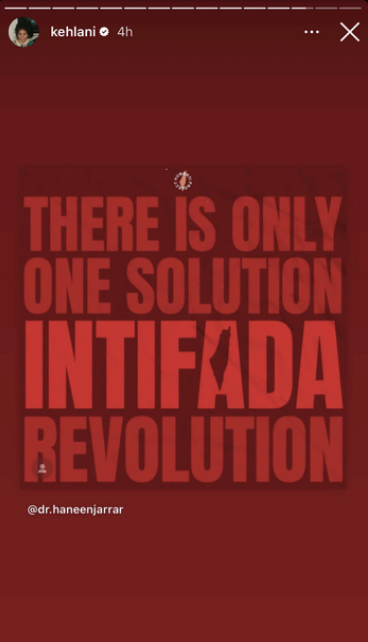Pro-Israel students at Cornell University are up in arms over an upcoming spring concert funded by hundreds of thousands of dollars in mandatory student fees featuring the singer Kehlani, who has endorsed “intifada” and said bluntly, “It’s f— Israel, it’s f— Zionism.”
Kehlani is slated to headline Cornell’s Slope Day, scheduled for May 7, an annual concert that marks the end of the school year. The university announced the event in a statement touting the “multi-Grammy Award-nominated R&B artist.” It did not initially acknowledge the controversy her appearance has kicked up, though university president Michael Kotlikoff said last week that the artist will not make political statements and will forfeit her fee if she does so.
Kehlani, whose anti-Israel activism has garnered national headlines, posted a series of Instagram videos last May in which she said she had lost “any ounce of f—ing respect” for musical artists who did not publicly condemn Israel and its war on Hamas.
“It’s f— Israel, it’s f— Zionism, and it’s also f— a lot of y’all too,” she said. Days later, she released the music video for her single “Next 2 U,” which opened with a graphic reading, “Long live the intifada,” a reference to violent periods in which Palestinians targeted Jewish civilians in terror attacks. She’s made similar statements in Instagram posts reading, “DISMANTLE ISRAEL. ERADICATE ZIONISM,” “There is only one solution, intifada revolution,” “Long live resistance in all of its forms,” and, “No one should feel comfortable or safe until Zionism is extinguished.”







The selection of Kehlani as the concert’s headliner has prompted pushback from Cornell’s pro-Israel community. The singer’s statements “go far beyond political critique” and target the “vast majority of Jews” at Cornell that consider themselves Zionists, Cornellians for Israel wrote in a petition calling for the university to choose a new headliner.
“The fact that the university would allow for students to bring in a performer with views that actively call for violence to an event where she is supposed to represent all students makes me feel like I am not a respected member of this community,” the petition reads.
The controversy comes as Cornell grapples with a $1 billion federal funding freeze over its response to campus anti-Semitism. The university faced criticism, for example, when it suspended an international graduate student who led illegal campus protests and lauded the “armed resistance in Palestine” but allowed the student, Momodu Taal to continue his studies online, a move that prevented the automatic revocation of his student visa. The Trump administration revoked Taal’s visa months later and he self-deported in late March.
Some Cornell parents say the decision to bring Kehlani to campus is an unforced error as the university looks to restore its relationship with the federal government. “Given the threatened loss of $1 billion for anti-Semitism, who at Cornell thought it would be a good idea to hire Kehlani for Slope Day,” one wrote in a private Facebook group.
Kotlikoff, the Cornell president, acknowledged concerns over Kehlani’s statements during a Student Assembly meeting last Thursday but said it was “too late to secure another performer that will be acceptable or appropriate for Slope Day.” The university was not aware of Kehlani’s statements when it began negotiations with her in October, Kotlikoff said. It altered the artist’s contract when it became privy to those statements “roughly three weeks ago.”
“We also altered that contract to make it clear that if there are any political events at the performance, there is full forfeit of the whole compensation,” he said.
Historically, that compensation has been substantial. Cornell’s Slope Day, originally known as “Spring Day,” first took place in 1902. Each year, thousands of students take to Ho Plaza on the last day of spring classes for a concert that often features A-list artists. Past headliners include rappers Snoop Dogg, Drake, and Kendrick Lamar.
The concert is funded through Cornell’s Student Activities Fee, which is mandatory for all undergraduates. That fee was $384 per student for the 2024-25 school year and will rise to $424 next year, and undergraduates cannot opt out of paying it.
As of now, $50 per student goes specifically to Slope Day, according to a Student Assembly resolution, generating a budget of roughly three quarters of a million dollars. It’s a substantial increase from the 2022-23 school year, during which Slope Day operated under a budget of $315,000. Students later complained of underwhelming headliners, prompting the funding increase.
Last year, about half of the $715,000 budget—$350,000—was allocated to talent, according to the Slope Day Programming Board, which organizes the event. Kehlani’s representatives did not respond to a request for comment on the specifics of the artist’s Slope Day Contract.
This year’s programming board is led by executive director Adelaida Dominguez, an undergraduate student studying engineering. When Cornell announced Kehlani as its Slope Day headliner, it quoted Dominguez by name. She appeared to reference Kehlani’s politics, calling the artist “an amazing performer” who “brings theatrics to the stage, along with a voice, presence, and lyrics that have an attitude of empowerment to them.” Cornell’s announcement statement no longer includes the names of the student organizers. Dominguez did not respond to a request for comment.
Though student input guides Slope Day artist selection—organizers distribute a survey during the fall semester gauging interest in performers—the decision ultimately falls to the programming board, which in addition to Dominguez includes vice president Nael Karpinski, director of artist relations and selections Remi Cooperstein, and promotions director Montserrat McCoy. This year’s selection “was influenced by timing and budget constraints,” Cornell said when it announced Kehlani’s appearance earlier this month.
“Music is a volatile industry, and this is such a big event,” Dominguez said in a statement that is now attributed to “SDPB’s executive director.”
“You have to be quick to make decisions and to react, and to see how you can make the best of different situations that arise. I’ve learned a lot of skills like delegation, resourcefulness, creativity, and also being flexible,” she continued.
A Cornell spokeswoman said Kehlani “was chosen by students based on her popularity and the genre of her music.”
“The personal views expressed by this artist are their own and do not represent the university,” the spokeswoman said.

















